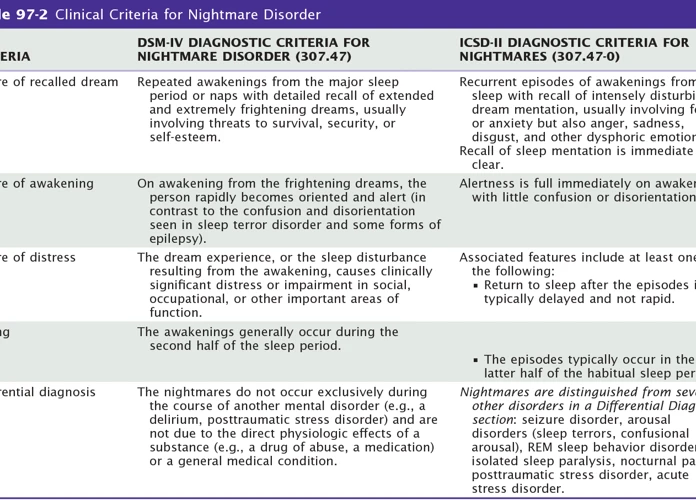Nightmare disorders can be perplexing, causing distress and disrupting sleep patterns. It is essential to differentiate between normal nightmares and clinical cases to ensure appropriate intervention and support. While nightmares are a common occurrence in many individuals, nightmare disorders encompass a range of symptoms that can significantly impact one’s well-being. By understanding the various types of nightmares, symptoms, causes, and available treatments, individuals can gain insight into these disorders and seek the necessary professional help. Let’s delve deeper into the world of nightmare disorders and explore the ways to differentiate normal nightmares from clinical cases.
What are Nightmares?

Nightmares are vivid, disturbing dreams that often evoke intense emotions such as fear, anxiety, or terror. They occur during the Rapid Eye Movement (REM) sleep stage, which is the phase of sleep associated with heightened brain activity. During a nightmare, individuals may experience a variety of distressing scenarios, ranging from being chased or attacked to witnessing a traumatic event. These dreams can feel incredibly real, awakening the sleeper with a sense of unease or panic. Nightmares can vary in frequency, with some individuals experiencing them occasionally while others may have recurring nightmares. While nightmares are a normal part of the dreaming process and can be influenced by various factors such as daily events, stress, or anxiety, they typically do not disrupt one’s daily functioning. However, when nightmares become more frequent, intense, and distressing, they may be indicative of nightmare disorders, requiring further attention and intervention.
Types of Nightmares

Nightmares can manifest in various forms, reflecting individual experiences and subconscious fears. Some common types of nightmares include anxiety-related nightmares, where individuals may find themselves trapped or unable to escape from threatening situations, such as falling from a great height or being chased by someone. Another type is post-traumatic nightmares, which occur in individuals who have experienced a traumatic event and may involve re-experiencing the event or elements associated with it during sleep. Recurrent nightmares involve experiencing the same or similar disturbing dream repeatedly, often leaving individuals feeling anxious or unsettled upon waking. Additionally, for children, nightmares related to fears of monsters or supernatural beings may be more common. Understanding the different types of nightmares can provide insight into their potential causes and help individuals seek appropriate support and techniques to overcome them. For more information on nightmares in children and how to help, you can read our article on nightmares in children.
1. Normal Nightmares
Normal nightmares are a common occurrence and are a natural part of the dreaming process. They can be triggered by various factors, such as a stressful event, anxiety, or even an overactive imagination. These nightmares typically occur sporadically and do not cause significant distress or impairment. They are often forgotten upon waking or may only leave a mild lingering sense of unease. Normal nightmares serve as a way for the mind to process emotions and experiences from daily life. They can even be viewed as a tool for self-reflection and personal growth. Individuals who experience normal nightmares can try various strategies like maintaining a consistent sleep schedule, creating a calm sleep environment, and practicing relaxation techniques to mitigate their impact on sleep quality. For those who want to explore additional methods to overcome nightmares, techniques like /slug-lucid-dreaming-tool-overcome-nightmares/ may provide helpful insights. It is important to note that normal nightmares should not be a cause for excessive concern, as they are typically transient and do not indicate a more significant underlying issue. However, if nightmares become increasingly frequent, intense, or disruptive, it may be beneficial to seek professional guidance to rule out any potential underlying causes, such as the influence of /the-influence-of-stress-and-anxiety-on-nightmares/.
2. Nightmare Disorders
Nightmare Disorders are a distinct category of sleep disorders characterized by recurrent nightmares that cause significant distress and impairment in daily functioning. Unlike normal nightmares, which are sporadic and temporary, nightmare disorders involve the recurrent occurrence of nightmares that disrupt an individual’s sleep and overall well-being. These nightmares often result in intense fear, anxiety, or feelings of terror, leading to a reluctance to fall asleep or a fear of sleep itself. Nightmare Disorders can be further categorized into specific disorders, such as Nightmare Disorder (previously known as Dream Anxiety Disorder) and Sleep-Related Eating Disorder (SRED). In Nightmare Disorder, the individual experiences repeated awakenings from nightmares, which may result in difficulty falling back asleep. SRED, on the other hand, involves episodes of compulsive eating during sleep, often accompanied by nightmares. It’s important to note that nightmare disorders can significantly impact a person’s daytime functioning, leading to increased fatigue, difficulty concentrating, and impaired performance in daily activities. Seeking professional help from a healthcare provider is crucial for accurate diagnosis and appropriate treatment of nightmare disorders.
Symptoms of Nightmare Disorders
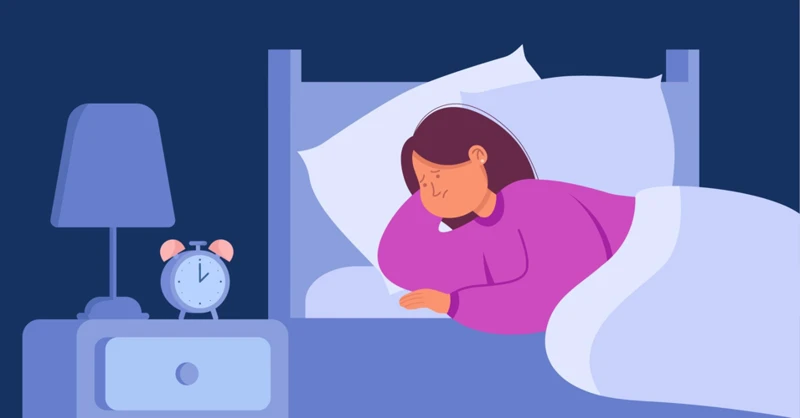
The symptoms of nightmare disorders differ from normal nightmares in their intensity, frequency, and impact on daily life. Individuals with nightmare disorders often experience recurring nightmares that cause significant distress and impairment. Some common symptoms of nightmare disorders include:
1. Nightmare Recurrence: Nightmares occur frequently, often several times a week or even nightly, causing significant sleep disruption and fear of going to sleep.
2. Emotional Distress: Nightmares in individuals with nightmare disorders evoke intense emotions such as fear, anxiety, or terror, leading to persistent feelings of distress even during wakefulness.
3. Impaired Sleep Quality: The vivid and disturbing nature of nightmares leads to sleep disturbances, resulting in poor quality sleep and fatigue during the day.
4. Physical Symptoms: Nightmare disorders can be accompanied by physical symptoms such as sweating, rapid heart rate, trembling, or even sleepwalking or screaming during the nightmare episode.
5. Daytime Disturbances: The psychological and emotional toll of nightmare disorders often extends into daytime functioning, causing difficulties with concentration, memory, irritability, mood changes, and impaired social or occupational functioning.
It’s important to note that these symptoms should persist for at least six months to meet the diagnostic criteria for nightmare disorders. If you or someone you know is experiencing these symptoms regularly and they are significantly impacting daily life, it may be necessary to seek professional help for proper diagnosis and treatment.
Causes of Nightmare Disorders
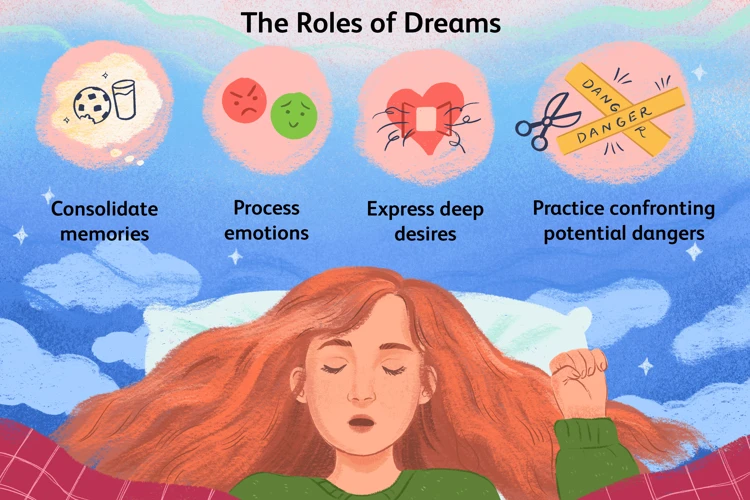
Nightmare disorders can be caused by a variety of factors, both physical and psychological. One possible cause is underlying mental health conditions such as anxiety, depression, or post-traumatic stress disorder (PTSD). These conditions can contribute to increased dream activity and a higher likelihood of experiencing nightmares. Additionally, certain medications, such as antidepressants, can affect sleep patterns and potentially trigger nightmares as a side effect. Substance abuse, particularly alcohol and drug use, can also disrupt sleep cycles and lead to nightmares. Sleep disorders, including sleep apnea and restless leg syndrome, have been associated with an increased risk of nightmare disorders as well. Another potential cause is experiencing traumatic events. Trauma, whether recent or in the past, can manifest in nightmares as the brain processes and tries to make sense of the distressing experiences. Additionally, external factors such as an irregular sleep schedule, sleep deprivation, or even environmental factors like sleeping in a noisy or uncomfortable space can contribute to nightmare disorders. Understanding the potential causes of nightmare disorders can help identify underlying issues and guide appropriate treatment strategies.
Differentiating Between Normal Nightmares and Clinical Cases
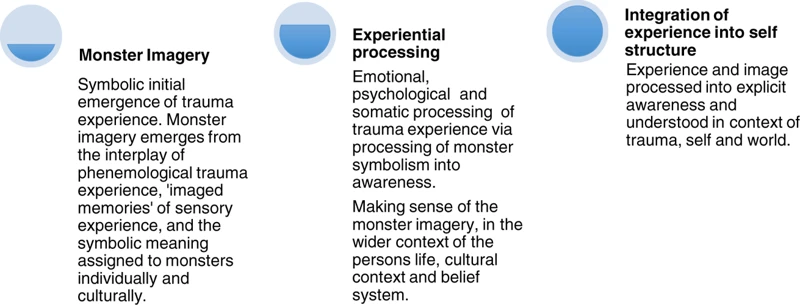
Differentiating between normal nightmares and clinical cases is crucial for determining the appropriate course of action. While both normal nightmares and nightmare disorders involve distressing dreams, there are certain factors that can help distinguish between the two.
Frequency and intensity: Normal nightmares may occur sporadically, without significantly disrupting sleep or causing a lasting impact on daily functioning. On the other hand, nightmare disorders involve recurrent nightmares that are intense, distressing, and often lead to difficulties falling back asleep.
Duration: Normal nightmares are typically fleeting, providing a temporary disturbance during the night. In contrast, nightmare disorders persist over time, with consistent and frequent occurrences that affect overall sleep quality and well-being.
Emotional impact: While normal nightmares may briefly elicit fear or anxiety, individuals can usually cope with these emotions upon awakening. Nightmare disorders, on the other hand, often result in persistent feelings of distress, fear, or terror beyond the dream itself, making it difficult to calm down or return to sleep.
Impairment in daily life: Normal nightmares do not commonly interfere with daily functioning. However, nightmare disorders can lead to significant distress, sleep disturbances, daytime fatigue, and impairment in areas such as work, relationships, or academic performance.
If an individual is experiencing recurrent, intense nightmares that significantly impact their well-being and daily life, it is advisable to seek professional help for a comprehensive evaluation. Consulting with a healthcare provider or sleep specialist can help determine if further assessment and treatment for a nightmare disorder are necessary. Remember, if you or someone you know is struggling with nightmares, it is essential to seek the proper support and guidance.
Diagnosis of Nightmare Disorders
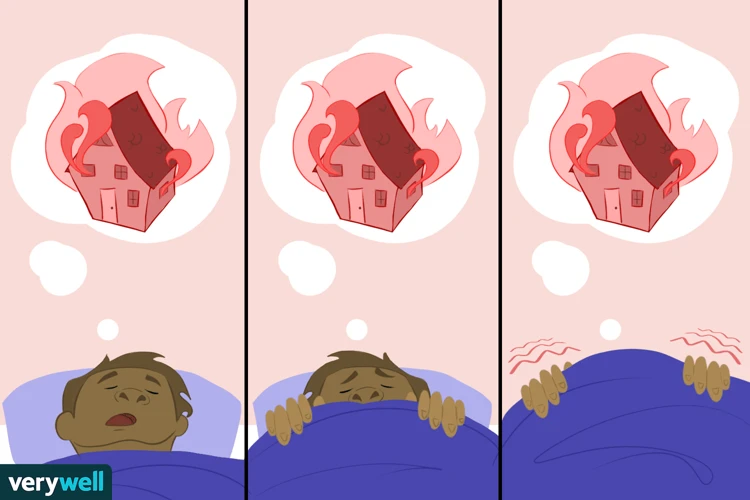
Diagnosing nightmare disorders involves a comprehensive assessment and evaluation by a qualified healthcare professional, such as a psychiatrist or sleep specialist. The diagnostic process typically begins with a thorough examination of the individual’s medical and psychiatric history. It is important to rule out any underlying medical conditions or medications that may be contributing to the nightmares. The healthcare professional may also conduct a detailed interview to gather information about the frequency, intensity, and content of the nightmares. Additionally, they may use validated screening tools or questionnaires to assess the severity of the condition and the impact it has on the individual’s daily life. In some cases, further diagnostic tests, such as polysomnography, may be recommended to analyze the person’s sleep patterns and detect any other sleep disorders that could be exacerbating the nightmares. It is crucial for the healthcare professional to make an accurate diagnosis to determine whether the individual is experiencing a nightmare disorder or if the nightmares are within the realm of normal dreaming. This will guide the development of an appropriate treatment plan to address the individual’s specific needs.
Treatment Options
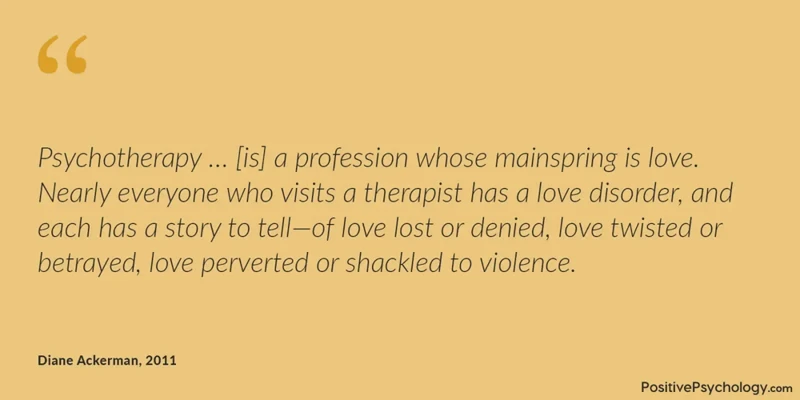
When it comes to treating nightmare disorders, there are several options available to help individuals find relief and improve their sleep quality. Treatment approaches may vary depending on the severity of the disorder and the underlying causes. Psychotherapy, such as cognitive-behavioral therapy for nightmares (CBT-N), is often recommended as a first-line treatment. CBT-N focuses on identifying and changing negative thought patterns and behaviors associated with nightmares, helping individuals develop coping strategies and relaxation techniques. Medications, such as antidepressants or prazosin, may also be prescribed to address specific symptoms or underlying conditions. Additionally, relaxation techniques such as deep breathing exercises, progressive muscle relaxation, and imagery rehearsal therapy can be beneficial in managing nightmares. It is important for individuals to consult with a healthcare professional to determine the most appropriate treatment options based on their specific needs and circumstances.
1. Psychotherapy
Psychotherapy is a commonly utilized treatment option for nightmare disorders. Specifically, Cognitive Behavioral Therapy for Insomnia (CBT-I) and Exposure, Relaxation, and Rescripting Therapy (ERRT) have shown effectiveness in reducing the frequency and intensity of nightmares. CBT-I focuses on addressing the underlying factors contributing to sleep disturbances, including anxiety and negative thought patterns. It helps individuals develop healthy sleep habits and manage stress through relaxation techniques and sleep hygiene practices. In ERRT, individuals are encouraged to confront the content of their nightmares in a therapeutic setting, where they can re-script and change the outcome of the dream to reduce distress. This therapy aims to desensitize individuals to their traumatic experiences and empower them to regain control over their dreams. Other psychotherapeutic approaches such as psychodynamic therapy and eye movement desensitization and reprocessing (EMDR) may be employed based on the individual’s specific needs. Psychotherapy provides a safe and supportive environment for individuals to explore and process their nightmares, ultimately leading to improved sleep quality and overall well-being.
2. Medications
2. Medications
Medications can be a valuable treatment option for nightmare disorders, particularly when other approaches have not yielded significant improvement. There are different types of medications that may be prescribed by healthcare professionals to help alleviate the frequency and intensity of nightmares. It’s important to note that medication should always be prescribed and monitored by a qualified healthcare provider.
Some common medications used for nightmare disorders include:
- Antidepressants: Certain antidepressant medications, such as selective serotonin reuptake inhibitors (SSRIs) and tricyclic antidepressants, may be prescribed to help regulate sleep patterns and reduce the occurrence of nightmares. These medications work by affecting neurotransmitters in the brain that are associated with mood and sleep.
- Antipsychotics: In some cases, antipsychotic medications may be prescribed to individuals with nightmare disorders. These medications can help manage symptoms such as hallucinations or dissociation, which may be present alongside severe nightmares.
- Beta-blockers: Beta-blockers, typically used to treat high blood pressure and heart conditions, have also shown promise in reducing the intensity of nightmares. These medications work by blocking the effects of adrenaline, potentially reducing the physiological response to fear or anxiety-related dreams.
- Sleep aids: In certain situations, healthcare providers may prescribe sleep aids or sedatives to help individuals with nightmare disorders achieve better sleep quality and limit disruptions caused by nightmares. These medications are typically used on a short-term basis due to potential side effects and the risk of dependence.
It’s crucial for individuals to discuss the potential benefits and risks of medication options with their healthcare provider. The choice of medication and dosage will depend on the specific symptoms, underlying conditions, and individual needs. Regular follow-up appointments will also be necessary to monitor the effectiveness and make any necessary dosage adjustments. Additionally, individuals should be aware of possible side effects associated with these medications and report any concerning reactions to their healthcare provider promptly.
3. Relaxation Techniques
There are a variety of relaxation techniques that can help individuals manage and reduce the impact of nightmare disorders. These techniques aim to promote relaxation, alleviate anxiety, and improve overall sleep quality. Some effective relaxation techniques for nightmare disorders include:
1. Progressive Muscle Relaxation (PMR): PMR involves systematically tensing and relaxing different muscle groups in the body. By consciously releasing tension from the muscles, individuals can induce a state of deep relaxation, which can help reduce anxiety and promote better sleep.
2. Deep Breathing Exercises: Deep breathing exercises, such as diaphragmatic breathing or belly breathing, can help activate the body’s relaxation response. By taking slow, deep breaths and focusing on the breath, individuals can calm their minds and bodies, reducing the likelihood of experiencing nightmares.
3. Guided Imagery: Guided imagery involves visualizing calming scenes or engaging in pleasant mental imagery. This technique can help distract the mind from distressing thoughts or images associated with nightmares, promoting a sense of tranquility and peace.
4. Meditation: Meditation practices, such as mindfulness meditation or loving-kindness meditation, can help individuals cultivate a greater sense of awareness, acceptance, and relaxation. Regular meditation practice can help reduce stress and anxiety, which in turn may minimize the occurrence of nightmares.
5. Sleep Hygiene: Establishing good sleep habits and maintaining a consistent sleep schedule can contribute to better overall sleep quality. Practices such as creating a comfortable sleep environment, avoiding stimulating activities before bed, and adopting a relaxing bedtime routine can help reduce the likelihood of nightmares.
It is important to note that the effectiveness of relaxation techniques may vary from individual to individual. It is recommended to explore different techniques and find those that work best for each person. Additionally, consulting with a healthcare professional or a licensed therapist can provide additional guidance and support in utilizing relaxation techniques to manage nightmare disorders effectively.
Prevention of Nightmare Disorders

Prevention plays a crucial role in managing nightmare disorders and reducing the frequency and intensity of nightmares. Here are some strategies that can help prevent nightmare disorders:
1. Establish a Relaxing Bedtime Routine: Creating a relaxing bedtime routine can signal to your body and mind that it is time to unwind and prepare for sleep. This can involve activities such as reading a book, taking a warm bath, or practicing relaxation techniques like deep breathing or meditation.
2. Manage Stress and Anxiety: Stress and anxiety can contribute to the occurrence of nightmares. Implementing stress management techniques, such as exercise, engaging in hobbies, or seeking support from a therapist, can help reduce stress levels and promote better sleep quality.
3. Create a Comfortable Sleep Environment: Ensure that your sleep environment is comfortable, quiet, and conducive to relaxation. Keep your bedroom cool, dark, and free from distractions. Use relaxation techniques, such as aromatherapy or soothing music, to create a peaceful atmosphere.
4. Avoid Stimulants Before Bed: Certain substances, such as caffeine and nicotine, can interfere with sleep patterns and increase the likelihood of experiencing nightmares. Limit or avoid the consumption of these substances before bedtime.
5. Address Underlying Mental Health Conditions: Nightmares can be a symptom of underlying mental health conditions, such as post-traumatic stress disorder (PTSD) or anxiety disorders. Seeking appropriate treatment for these conditions, including therapy and medication if necessary, can help alleviate nightmares.
6. Maintain a Consistent Sleep Schedule: Going to bed and waking up at consistent times helps regulate your body’s internal clock and promotes healthy sleep patterns. Aim for seven to eight hours of quality sleep each night.
By implementing these prevention strategies, individuals can reduce the occurrence of nightmare disorders and improve the overall quality of their sleep. Remember, if nightmares persist or significantly impact daily life, it is important to seek professional help for proper diagnosis and treatment.
Seeking Professional Help
Seeking professional help is crucial for individuals who are experiencing frequent and distressing nightmares that significantly impact their well-being. When nightmares interfere with daily functioning, cause severe emotional distress, or disrupt sleep patterns, it is essential to consult with a healthcare professional or mental health specialist. A qualified healthcare provider can conduct a comprehensive evaluation to determine the underlying cause of the nightmare disorder and recommend appropriate treatment options. Psychotherapy, such as cognitive-behavioral therapy, can be highly effective in treating nightmare disorders by helping individuals understand and cope with the underlying emotions and fears associated with nightmares. Additionally, medications may be prescribed in some cases to alleviate symptoms or manage underlying conditions that contribute to nightmares. Relaxation techniques and stress management strategies may also be recommended to promote better sleep and reduce anxiety. Remember, professional support can provide valuable guidance and support in managing nightmare disorders and improving overall well-being.
Conclusion
In conclusion, understanding the difference between normal nightmares and clinical cases of nightmare disorders is crucial for identifying when professional help is needed. While nightmares are a common occurrence and often influenced by daily stressors, anxiety, or traumatic events, nightmare disorders encompass a more severe and disruptive pattern of distressing dreams. By recognizing the symptoms and causes of nightmare disorders, individuals can seek the appropriate diagnosis and treatment options, such as psychotherapy, medications, or relaxation techniques, to alleviate the distress and improve sleep quality. Additionally, prevention strategies and seeking professional help play significant roles in managing nightmare disorders effectively. It is important to remember that seeking support and intervention is essential for those who are experiencing significant distress due to nightmares. With proper help, individuals can regain control over their sleep and overall well-being.
Frequently Asked Questions
1. Can nightmares be considered a normal part of sleep?
Yes, nightmares are a normal part of sleep and dreaming. They can be influenced by various factors such as daily events, stress, or anxiety. Occasional nightmares are generally not a cause for concern.
2. What distinguishes nightmare disorders from normal nightmares?
Nightmare disorders are characterized by more frequent, intense, and distressing nightmares that significantly disrupt a person’s sleep patterns and overall well-being. Unlike normal nightmares, nightmare disorders can have a severe impact on daily functioning.
3. Are nightmare disorders common?
Nightmare disorders are relatively uncommon, with only a small percentage of the population experiencing them. However, occasional nightmares are more prevalent and considered a normal occurrence.
4. Can young children have nightmare disorders?
Yes, nightmare disorders can occur in children. If a child frequently experiences intense nightmares that disrupt their sleep and cause distress, it may be indicative of a nightmare disorder. Seeking professional help is recommended in such cases.
5. How does stress and anxiety affect nightmares?
Stress and anxiety can influence the content and frequency of nightmares. High levels of stress or unresolved anxiety can increase the likelihood of experiencing intense and distressing nightmares.
6. Is there a link between nightmares and trauma?
Nightmares can be associated with traumatic experiences. Individuals who have experienced trauma, such as being involved in accidents or witnessing violence, may be more prone to nightmares related to the traumatic event.
7. What role does sleep hygiene play in managing nightmares?
Practicing good sleep hygiene, such as maintaining a consistent sleep schedule, creating a relaxing bedtime routine, and ensuring a comfortable sleep environment, can help reduce the frequency and intensity of nightmares.
8. Can medications help treat nightmare disorders?
Yes, certain medications, such as selective serotonin reuptake inhibitors (SSRIs), may be prescribed to help manage nightmare disorders. However, medication should be used under the guidance of a healthcare professional.
9. How effective is psychotherapy in treating nightmare disorders?
Psychotherapy, particularly techniques such as imagery rehearsal therapy (IRT), has shown promising results in the treatment of nightmare disorders. It helps individuals modify the content and emotional impact of their nightmares.
10. Can lucid dreaming techniques help overcome nightmares?
Lucid dreaming, a practice in which individuals become aware that they are dreaming, has been explored as a potential tool to overcome nightmares. By gaining control over their dreams, individuals may be able to alter the course of a nightmare into a more positive experience.

